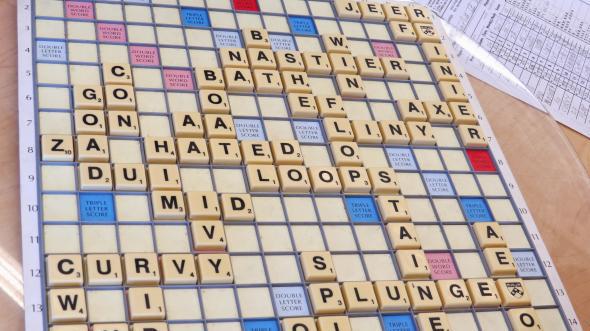There’s a disconnect between how professional lexicographers and the general public consider words. For the dictionary people, sanctioning words is a painstaking process that can’t be rushed. But the creation and popularization of letter combinations by consumers of language is an endless rush. One is a refined art, the other a chaotic scrum.
That clash rarely winds up in the linguistic town square. But that’s what’s happening in the contest being staged by Scrabble owner Hasbro Inc. and dictionary publisher Merriam-Webster Inc. to add one word to the game’s official lexicon. When I wrote about the contest on Slate last month, I picked my own set of 16 words for the companies’ March Madness-style bracket. I included widely used words that have skirted addition to the standard college dictionaries that form the Scrabble word list (blondie, internet, onesie); colloquialisms that have solidified in popular use (bestie, whassup, spork); and short lexicographically defensible words that would prove useful in the game (min, ew, zen).
On Tuesday, Hasbro released its Sweet 16, which have begun battling. Only three of my suggestions made the final cut: ew, zen, and bestie. The remaining 13 include catch-phrase words like booyah and the execrable adolescent truncation adorbs. There are a handful of portmanteau words: phablet, hangry, emotypo, cosplay, geocache, and lifehack. There are tech words, including four from the previous sentence plus retweet and bitcoin. And there’s one tech/catch-phrase crossover, woot.
How lexicographically defensible are the finalists? The primary source for the Official Scrabble Players Dictionary is Merriam-Webster’s Collegiate Dictionary. As dictionaries go, it’s conservative. The Collegiate is designed to be a collection of active vocabulary of American English—with “active” defined as found in many print sources over time, and “time” defined as many years. The contest words all met a lower bar—that there are existing citations for them in print—than the more exacting standards of the Collegiate (or, of course, they’d already be in).
According to Merriam-Webster editor-at-large Peter Sokolowski, some of the final 16 have a long history. The company’s citations date bestie to 1991, cosplay to 1993 (a decade earlier in Japanese), and nowish to 1999 (making it not as newish as you might have thought). Woot traces its lineage from 95 South’s 1993 dance hit “Whoot, There It Is” to mutiplayer game lingo (with double zeros instead of double O’s) to today’s predominant use as an exclamation. Booyah might be best known as a catch-phrase used by Al Pacino, Stuart Scott, and Jim Cramer (in that order), but it’s also the possibly misspelled name of a stew made in the Upper Midwest.
Will geocache (circa 2007), bitcoin (2009), and phablet (2010) stand the test of time? Will we still be retweeting in 2020, or will some other social medium turn Twitter into Prodigy? Will a poker player—or a Scrabble player—call his victorious opponent a luckbox forevermore or not much longer? Those questions matter to lexicographers. But lexicographers didn’t assemble the contest list. Employees of Hasbro did. And they were judging words not by their lexicographic credibility or their Scrabble playability but by eye-test popularity and hashtag-trendability. Hasbro wants publicity: eyeballs on its Facebook page, downloads of its Scrabble apps, sales of the new dictionary.
The winning word will be playable at the National School Scrabble Championship in Providence, R.I., later this month and at the National Scrabble Championship in Buffalo, N.Y., in August (when the updated Scrabble dictionary, with a total of 5,000 new words, will be released). Let’s make sure it’s worthy. I have two criteria: that the word has lexicographic bona fides—because it’s going to be in the Scrabble lexicon for good—and that it will have an impact on the game.
We’re a little late here—Round 2 of balloting began over the weekend, with four words eliminated. But here, in all-caps Scrabble style, are my pretournament picks:
Sweet 16: BOOYAH over LUCKBOX (BOOYAH won); EMOTYPO over PHABLET (PHABLET won); ZEN over WOOT (ZEN won); BESTIE over ADORBS (BESTIE won); NOWISH over HANGRY; EW over RETWEET; GEOCACHE over BITCOIN; COSPLAY over LIFEHACK.
Elite Eight: BOOYAH over PHABLET; ZEN over BESTIE; EW over NOWISH; COSPLAY over GEOCACHE.
Final Four: ZEN over BOOYAH; EW over COSPLAY.
Championship: EW over ZEN.
Ew wins. Jimmy Fallon, Will Ferrell, and Michelle Obama concur.
